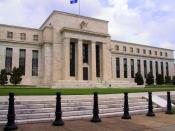Timber Industry�� PAGE \* MERGEFORMAT �6���
Timber Industry Economic Profile
Crystal Kendall
Axia College of University of Phoenix
�
Following is a discussion of the timber industry including how several economic factors affect it, including: price elasticity of supply and demand; positive and negative externalities; wage inequality; and monetary and fiscal policies.
Price Elasticity
Important to note is that the timber industry and the lumber industry are not one in the same and experience differences price elasticity. The price elasticity of demand for the timber industry is inelastic. Often landowners will hold inventory to sell at a later date if demand is low. The timber will not lose value in storage so price does not need to change. The price elasticity of supply for the timber industry is elastic, as prices typically increase in the spring due to low volume of timber as a result of winter weather.
Possible Negative Externalities
Recreational and Commercial Fishing: Corporations may elect not to harvest timber and lose earnings if timber harvesting damages the fish habitat.
Water Pollution: If timber harvesting pollutes the public water system, costs may be incurred in the remunerations effort.
Risk of Flooding: Increased runoff my decrease sewer capacity costing taxpayers additional money to repair the damage.
Water-Quality Reduction: If timber harvesting decreases the quality of water, other companies that use the water to cool or clean their equipment or products may suffer damages.
Possible Positive Externalities
Recreational Opportunities: Forests provide many recreational opportunities such as hunting, fishing, camping, and hiking.
Essential Habitats: Forests provide essential habitats for endangered plant and animal species.
Wage Inequality
Wage inequality is virtually nonexistent in the timber industry. However, false accusations of wage inequality are sometimes floated by anti-forestry groups such as Greenpeace. One example of this happened to a Papua New Guinea (PNG)...


